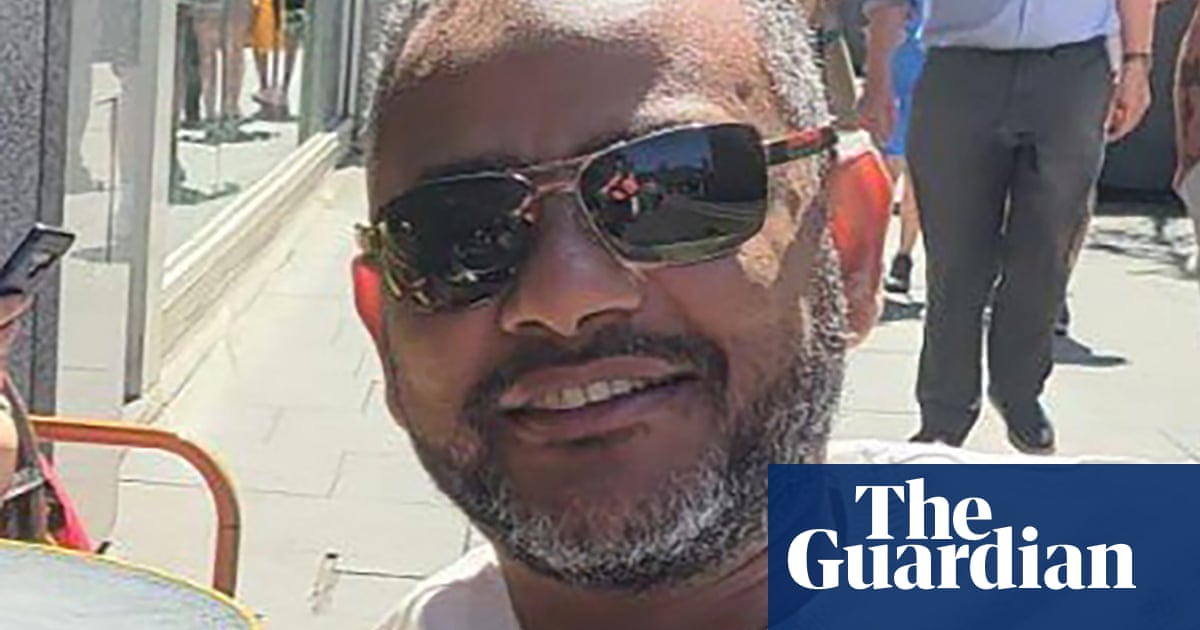As Donald Trump and the Saudi crown prince, Mohammed bin Salman, prepare to meet in Riyadh on Tuesday to celebrate a “golden age” in trade, a British national will appear in a Riyadh court facing the threat of an extended prison sentence for a tweet.
The UK Foreign Office has so far been denied access to his trial and his British lawyer says he is still not clear what offence Ahmed al-Doush has committed, or how the trial proceedings are being conducted. He is due in court on Monday.
The UK foreign secretary, David Lammy, on Saturday spoke by phone with the Saudi foreign minister, Prince Faisal bin Farhan bin Abdullah, a fact released by the Saudi side. Details of the call, and whether Doush’s trial was raised, were not revealed.
Doush, a Manchester-based father of four and former business analyst with Bank of America, has not been granted a Saudi lawyer of his choice and found it difficult to speak to his family on the phone about his case. Saudi prison officers have told him that he cannot speak about the hearing or his prison conditions. It is not clear if he will be sentenced on Monday when he appears in court.
Haydee Dijkstal, a barrister at 33 Bedford Row Chambers, and international counsel for Doush, said: “Under international law, a detained person has the right to be promptly informed of both the reasons for arrest and continued detention and of the charges.
“This obligation not only means that the state must inform the detained person of the law and provision under which they are charged, but also the facts and evidence that form the charge.
“Over three months since Doush was charged, and with indications of his trial nearing conclusion and a judgment imminent, it is still not clear whether the tweet allegedly supports the charge against him. This reality is not only in direct contradiction of the most basic principles of due process, but is exacerbated by information of numerous other fair trial and due process violations in his case.”
His wife, Amaher Nour, is said to be in a state of deep distress, since her husband was the sole breadwinner, and her contact with him has been so restricted.
The case again raises wider issues about Saudi censorship of social media and its use of anti-terrorism laws to suppress free speech. Doush has been represented by the civil rights group Reprieve.
In a response to a letter from Reprieve to Lammy concerning the case, a Foreign Office official wrote that “the UK government cannot interfere in another country’s legal processes and must respect their systems, nor can we get British nationals out of jail”. The letter, dated 2 April, accepted the events must be incredibly distressing to the family.
Sign up toFirst Edition
Our morning email breaks down the key stories of the day, telling you what’s happening and why it matters
after newsletter promotion
The official said Lammy was aware of the case, adding officials in Riyadh had persistently raised concerns with the authorities on Doush’s treatment in detention.
It added that it was for Doush to ask the judge to grant his Saudi lawyer permission to share details of the case, something his family claims he had already done, but to no avail. The Foreign Office also told Reprieve that they could not comment on the case as this is “a matter for his legal team”.
Doush appears to have been charged in front of a specialised criminal court in relation to a deleted tweet about the war in Sudan, and separately due to a friendship with the son of a Saudi dissident. His family says this friendship did not extend to the discussion of politics.
He was arrested as he prepared to leave King Khalid international airport in Riyadh on 31 August last year. He was intending to return to the UK with his family and his three children, but at his request the family returned home while he was held back at the airport. The family, including his then pregnant wife, returned to the UK but were not allowed any contact with him until November. He did not attend court until that month, the first time he was permitted a consular visit.
Saudi Arabia has previously declined to make any statement about the case.
